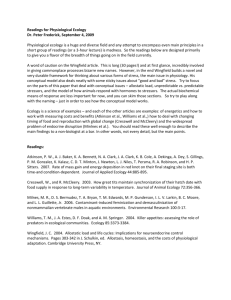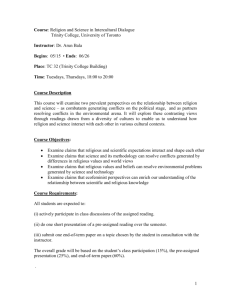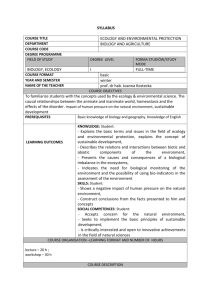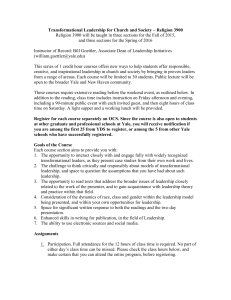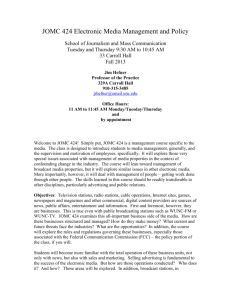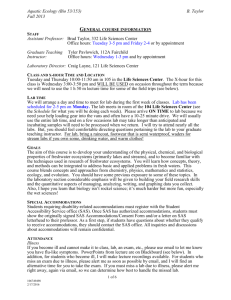Professors: Mary Evelyn Tucker and John Grim
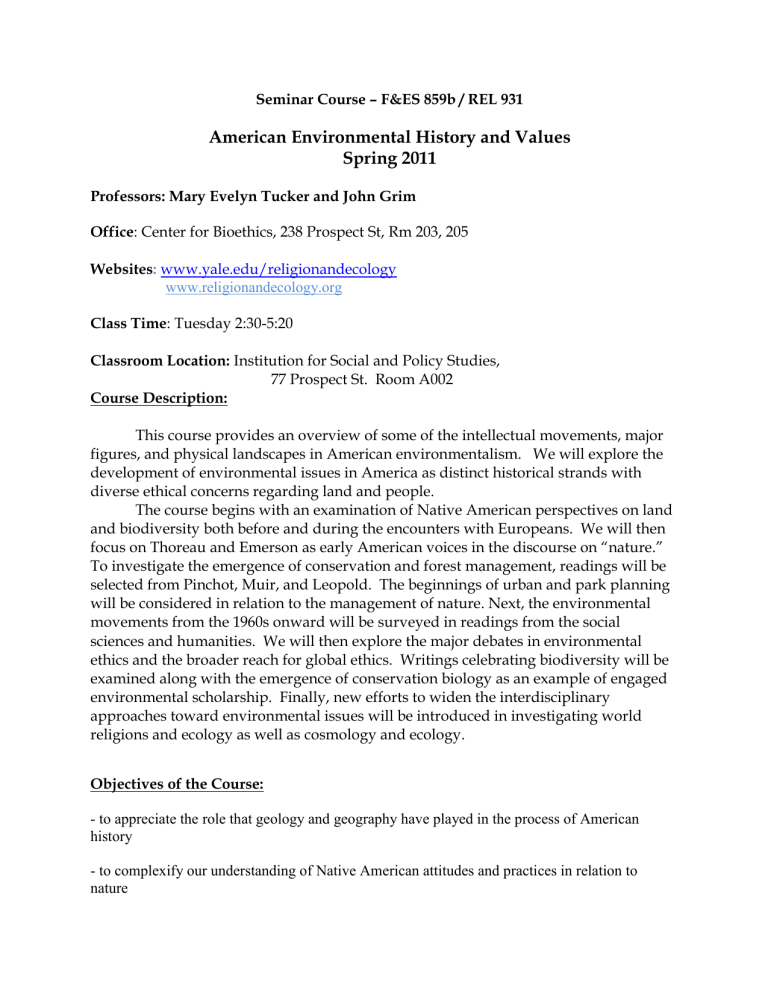
Seminar Course – F&ES 859b / REL 931
American Environmental History and Values
Spring 2011
Professors: Mary Evelyn Tucker and John Grim
Office: Center for Bioethics, 238 Prospect St, Rm 203, 205
Websites : www.yale.edu/religionandecology www.religionandecology.org
Class Time: Tuesday 2:30-5:20
Classroom Location: Institution for Social and Policy Studies,
77 Prospect St. Room A002
Course Description:
This course provides an overview of some of the intellectual movements, major figures, and physical landscapes in American environmentalism. We will explore the development of environmental issues in America as distinct historical strands with diverse ethical concerns regarding land and people.
The course begins with an examination of Native American perspectives on land and biodiversity both before and during the encounters with Europeans. We will then focus on Thoreau and Emerson as early American voices in the discourse on “nature.”
To investigate the emergence of conservation and forest management, readings will be selected from Pinchot, Muir, and Leopold. The beginnings of urban and park planning will be considered in relation to the management of nature. Next, the environmental movements from the 1960s onward will be surveyed in readings from the social sciences and humanities. We will then explore the major debates in environmental ethics and the broader reach for global ethics. Writings celebrating biodiversity will be examined along with the emergence of conservation biology as an example of engaged environmental scholarship. Finally, new efforts to widen the interdisciplinary approaches toward environmental issues will be introduced in investigating world religions and ecology as well as cosmology and ecology.
Objectives of the Course:
- to appreciate the role that geology and geography have played in the process of American history
- to complexify our understanding of Native American attitudes and practices in relation to nature
- to understand the ways in which the conservation movement in America has been shaped by particular individuals, ideas, and institutions
- to examine various ways of valuing nature, that is, ethically, religiously, and aesthetically as well as economically, legally, and politically
Required Texts:
American Earth: Environmental Writings Since Thoreau
Bill McKibben (ed.) The Library of America, 2008
Down to Earth: Nature’s Role in American History Ted Steinberg, Oxford, 2009.
Ecological Ethics: An Introduction Patrick Curry, Polity Press, 2006.
Worldly Wonder: Religions Enter Their Ecological Phase Mary Evelyn Tucker,
Open Court, 2004
Required Readings (Along with reading from American Earth, ClassesV2 listed)
Viola Cordova, "Bounded Space," in How It Is: The Native American Philosophy of
V.F.Cordova University of Arizona Press, 2007
Vine Deloria, Jr., "Thinking in Space and Time," and "The Problem of Creation," in God
is Red Dell Publishing, 1973: 75-109.
_______, "Trouble in High Places: The Erosion of American Indian Rights in the United
States," in The State of Native America A. Annette Jaimes (ed.) South End Press, 1992:
267-290.
Suggested Secondary Texts:
**American Environmental History: An Introduction Carolyn Merchant, Columbia
University Press, 2007. In Bookstore
(An excellent text with helpful resources, glossaries, and bibliographies)
Silent Spring
Rachel Carson, Houghton Mifflin, 1962.
Nature’s Economy: A History of Ecological Ideas
Donald Worster, Cambridge, 1994 (2 nd ed,).
Changes in the Land: Indians, Colonists, and the Ecology of New England
William Cronon, Hill & Wang, 1983.
2
2
3
Environmental Anthropology: A Historical Reader
Michael Dove and Carol Carpenter (eds.) Blackwell, 2008.
Original Instructions: Indigenous Teachings for a Sustainable Future
Melissa Nelson (ed.) Bear & Co., 2008.
American Indian Environments: Ecological Issues in Native American History
Christopher Vecsey and Robert Venables (eds.) Syracuse University Press, 1980.
Course Requirements:
1. regular attendance, participation in class discussion, short class presentation: 20%
2. mid-term take-home essay exam: 40%
3. final take-home essay, or paper exam due beginning of exam week: 40%
Course Exams
There will be a Mid-term exam and a Final exam in this course. Each exam will be a
Take-Home and a week is given for completion.
Schedule of Classes and Readings:
January 11 Images of Native Americans:
American Earth, Scott Momaday, George Caitlin and on V2, Viola Cordova
Down to Earth, ch 1&2 Lecture by John Grim
January 18 Experiencing Nature:
American Earth: Henry David Thoreau
Reading from Ralph Waldo Emerson
Down to Earth, ch 3
January 25 Conserving Nature: John Muir and Gifford Pinchot
Down to Earth, ch 9
February 1 Managing Nature:
American Earth, Aldo Leopold and Forest Management
Down to Earth, ch 4 Guest speaker: Julianne Warren, NYU
February 8 Creating Cities and Parks:
American Earth, Frederick Olmstead, Jane Jacobs, Edward Abbey,
Ken Burns series on National Parks
Down to Earth, ch 10 Guest Lecturer: Mark Ashton
February 15 Food, Farming, and Animals:
3
American Earth, Wendell Berry, Gary Snyder, Wes Jackson,
WS Merwin, Scott and Helen Nearing
Down to Earth, ch 6,11,12
Guest speaker: Farmer Steve Munno, Massaro Farm, Woodbridge CT
February 22 Environmental Movements:
American Earth, Rachel Carson, Dennis Hayes, John McPhee, Joseph Lelyveld,
Carl Anthony, Robert Bullard, Lois Gibbs
Down to Earth, ch.15 Mid-Term Distributed
March 1 Native American Voices:
American Earth, Scott Momaday, Leslie Marmon Silko, Linda Hogan
Selections from Vine Deloria Mid-Term Due
March 4-20 Spring Break
March 22 Cosmology and Ecology:
American Earth, Loren Eiseley, Lewis Thomas,
Readings from Thomas Berry and Brian Swimme
Guest speaker: Brian Swimme
March 25 Film – Journey of the Universe Kroon Hall, Burke Auditorium 7 PM www.journeyoftheuniverse.org
March 29 Environmental Ethics and the Earth Charter:
Readings from: Baird Callicott, Holmes Rolston, Steven Rockefeller
Guest speaker: Willis Jenkins, Yale Divinity School
April 5 Religion and Ecology:
American Earth, Lynn White, Calvin DeWitt, Sandra Steingraber
The Forum on Religion and Ecology at Yale www.yale.edu/religionandecology
April 12 Biodiversity and Conservation Biology: Tom Lovejoy, Michael Soule,
American Earth, Rick Bass, George Schaller, Ellen Meloy, Jack Turner,
Richard Nelson, David Quammen, Julia Butterfly Hill
April 19 Concluding Session
Final Exam Distributed – Due Exam Week
4
4
